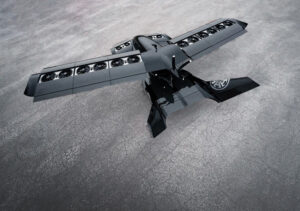The rapid growth in the Advanced Air Mobility market and advances in establishing a regulatory framework for the sector is making electric Vertical Takeoff and Landing (eVTOL) an increasingly attractive market for professional investment, according to new global research from New Horizon Aircraft.
Its global study with senior executives at leading investment firms in Japan, the U.S., Canada, Europe, the Middle East and Asia, responsible for more than $1.787 trillion assets under management found 93% say professional investors are increasingly interested in the eVTOL sector, which has the potential to revolutionize urban transportation. Only 4% of those surveyed disagreed.
It is broadly accepted that certification by relevant aviation authorities should be made easier by the fact that eVTOLs that fly most of their time as normal aircraft are safer. Around 92% of professional investors said this was an important factor when considering investing in the sector.

Horizon Aircraft’s Cavorite X7 aircraft (Image: Horizon Aircraft)
However, the study also shows that the investment community is wary of some aggressive and fast-tracked development timelines that have been set by key players in the industry. Around 82% of investors agree that some of these ambitious targets don’t properly reflect how long traditional aircraft programs generally take to get to market.
The versatility of eVTOL aircraft to be used in a variety of transport markets including air passenger taxi services, cargo transportation and military service, is seen as an important reason for supporting the sector by 92% of those surveyed.
Horizon is targeting the future production of a manned seven-seat capacity hybrid-electric eVTOL called the Cavorite X7 which includes room for a pilot and six passengers. It has been developed in response to demand from potential customers in the medical evacuation, business aviation and commercial cargo sectors.
“Private equity, venture capital and family office investors have been closely monitoring the Future Air Mobility sector for some time,” said Brandon Robinson, CEO of Horizon Aircraft. “However, our study affirms that as the sector matures with advances in technology and a clearer path to regulatory approval, professional investors are increasingly seeing the eVTOL sector as not only a financially viable opportunity to invest in but also a chance to contribute to a transformative shift in how people move around within urban environments.”
Its Cavorite X7 aircraft will have a gross weight of around 5,500 pounds with a projected useful load of 1,500 pounds. With an estimated maximum speed of 250 miles per hour and an average range of over 500 miles with fuel reserves, Horizon believes that this experimental aircraft, if eventually licensed for commercial use, would be well-positioned to excel in medical evacuation, critical supply delivery, disaster relief, and special military missions. The company believes the proposed aircraft would also be attractive for regional air mobility – moving people and cargo 50 to 500 miles.
Unlike many in its category, the Cavorite X7 is being designed with a hybrid-electric power system. The company is designing the Cavorite X7 so that it could re-charge its batteries en route when flying in a configuration like a traditional aircraft after its vertical takeoff. After a vertical landing and completion of a mission, the company is designing the Cavorite X7 to recharge its battery array in under 30 minutes to be ready for its next mission.
Horizon believes that its innovative approach and technology will allow the Cavorite X7 to fly 98% of its mission in a low-drag configuration like a traditional aircraft. The company believes that flying most of the time as a normal aircraft is also safer and will make the aircraft easier to certify than other radical new eVTOL designs. The Cavorite X7 will be powered by a hybrid electric system that will recharge the battery array in-flight and post-flight, while also providing significant system redundancy. The company is continuing the testing of its 50%-scale aircraft that it believes will reduce technical risk moving forward as it continues to develop its full-scale aircraft.